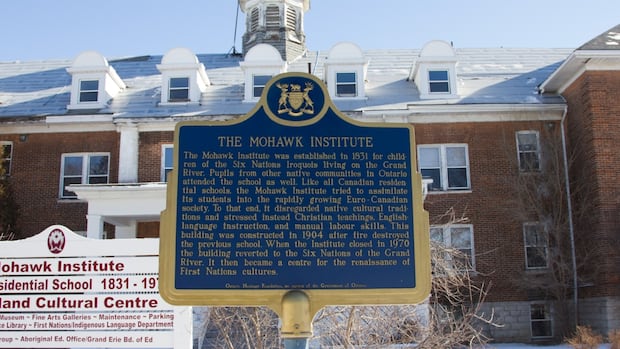A residential school survivors’ group on the verge shutdown due to a lack of funding is accusing the federal government of breaking promises and lying to survivors about Canada’s commitment to uncovering the truth.
The Survivors’ Secretariat, which is conducting an investigation into missing children and unmarked burials associated with the former Mohawk Institute Indian Residential School in Brantford, Ont., says it will have to close its doors at the end of the month unless it receives a decision from Crown-Indigenous Relations.
The non-profit organization has not received a cent so far this fiscal year and stopped working on two important projects just to maintain core operations, said secretariat lead Laura Arndt. But the secretariat is set to run out of money imminently.
“It goes against reconciliation and it goes against the calls to action. But most importantly it’s a lie to survivors who were promised better than this,” Arndt said in an interview with CBC Indigenous this week.
“They spent their whole life fighting to get to the truth, and here we stand where they don’t know if the organization will continue beyond Dec. 31.”

Arndt cited past promises from Prime Minister Justin Trudeau and Crown-Indigenous Relations Minister Gary Anandasangaree, who pledged to stand with survivors as they seek to uncover the truth of what happened in Canada’s Indian residential school system.
This was in 2021, after more than 200 potential unmarked burials were found at the former Kamloops Indian Residential School in British Columbia. Ottawa set up a community support fund the following year with a “solemn commitment to finding the children.”
Arndt, echoing the words of Mohawk Institute survivor Roberta Hill, said of those promises, “they lied.”
Not only did Canada try to cut and cap the available cash from the community support fund, only to have to walk it back, Anandasangaree’s department has blocked communities from using the money for invasive archeological investigations, said Arndt.
Meanwhile, a national advisory committee working on access to records resigned en masse over their own lack of funding. These actions send a message to survivors that Ottawa isn’t as committed as it says it is, said Arndt.
“Whether Canada is doing this purposefully or not, it fuels a denialist frame and it blocks those of us who are doing this work from getting the facts,” she said.
Canada responds
Anandasangaree’s spokesperson said he was not available for an interview this week. In a statement, Bahoz Dara Aziz did not address the secretariat’s concerns or explain why no funding was released this fiscal year.
“The application deadline was Nov. 15. This has always been the date conveyed and is in line with previous years timelines. As is the case with any program, we must assess all requests based on the criteria provided to communities and organizations,” she wrote in a statement.
“We created this fund in order to support communities in their healing journey in response to the shameful history of residential schools. We’re very much committed to doing that.”
The Mohawk Institute, known as the Mush Hole for the tasteless gruel children were fed, was the oldest and longest-running residential school in Canada. It operated from 1828 to 1970, first by the Anglican Church and then the federal government.
The National Centre for Truth and Reconciliation documented 48 deaths linked to the institute, but the secretariat’s investigation has already more than doubled that number, bringing the number to 101 known deaths.
Kimberly Murray, the special interlocutor for missing children and unmarked burials associated with residential schools, has repeatedly criticized Crown-Indigenous Relations for treating these searches like any other program.
Murray, whose two-year mandate ends this month, recently released a final report arguing children who died and were buried at residential schools aren’t just missing, but victims of the crime against humanity of enforced disappearance.
She argued Canada has obligations under international law to facilitate access to the truth, meaning it’s required to ensure adequate funding. Ottawa hasn’t commented on her report yet.
The government estimates 150,000 Indigenous children attended residential schools, a church-run, state-funded system of assimilation that operated countrywide for more than a century.
The Truth and Reconciliation Commission concluded the system was a central element of a Canadian policy of cultural genocide.



1734894422-0/Copy-of-Untitled-(72)1734894422-0.png)



